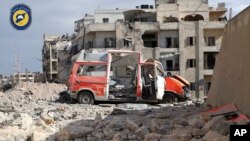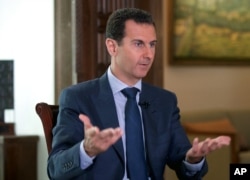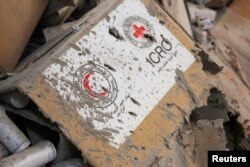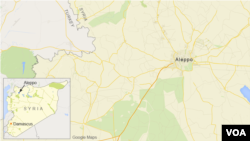Russia said Thursday it supports a 48-hour cease-fire in the northern Syrian city of Aleppo, but not a longer truce proposed by the United States.
Russian Deputy Foreign Minister Sergei Ryabkov said a week-long cease-fire would give militants time to regroup and replenish supplies.
His comments came a day after U.S. Secretary of State John Kerry told his Russian counterpart Sergei Lavrov that Washington is making preparations to suspend bilateral engagement with Russia on Syria, unless Moscow takes immediate steps to end the assault on Aleppo and restore the cessation of hostilities agreed to by the two powers on September 9.
"The secretary made clear the United States and its partners hold Russia responsible for this situation, including the use of incendiary and bunker buster bombs in an urban environment, a drastic escalation that puts civilians at great risk," Kerry’s spokesman John Kirby said in a statement.
The two countries have tried at various times during Syria's five-year conflict to use their influence on the opposing sides in order to push for peace talks and cease-fire agreements. But as with the latest deal on Aleppo, those truces have broken down as the fighting continued.
Assad alliance
Kirby also suggested Wednesday that Russia's alliance with Syrian President Bashar al-Assad's military raised the threat of a terror attack back home.
"The consequences are that the civil war will continue in Syria, that extremists and extremists groups will continue to exploit the vacuums that are there in Syria to expand their operations, which will include, no question, attacks against Russian interests, perhaps even Russian cities, and Russia will continue to send troops home in body bag," he said.
Russia's Ryabkov criticized Kirby's remark, saying it could only be interpreted as U.S. support for terrorism.
Russian Foreign Ministry spokeswoman Maria Zakharova was also quoted by Russian media saying the U.S. has not lived up to its commitment in the cease-fire deal to separate moderate Syrian rebel groups from militants involved in the multi-party war.
Humanitarian aid
The halt in fighting was also meant to allow for food and medical aid to reach people in Aleppo, where on Wednesday airstrikes hit the two largest hospitals in the rebel-held eastern part of the city.
U.N. Secretary-General Ban Ki-moon condemned those attacks as "war crimes."
"Let us be clear: Those using ever more destructive weapons know exactly what they are doing," Secretary-General Ban told a U.N. Security Council session on healthcare in conflict on Wednesday. "They know they are committing war crimes."
The U.N. chief expressed his utter frustration with the situation.
"Imagine a slaughterhouse.This is worse.Even a slaughterhouse is more humane," he said.
Damage from the strikes temporarily knocked the facilities out of service, further limiting medical care in a part of the city where more than 250,000 people are besieged by the government as it mounts a fierce military offensive to retake the rebel-controlled sector.
Shortage of doctors
According to UNICEF, the health system in eastern Aleppo is crumbling with just some 30 doctors remaining, hardly any equipment or emergency medicine to treat the injured, and an ever-increasing number of trauma cases.
It was not immediately clear who was responsible for the attacks on the hospitals, but militaries from Syria and its ally Russia, are operating in the area.
"It is very, very clear that there are only two air forces operating over Aleppo – that is the Syrian regime and the Russians," Britain’s deputy U.N. Ambassador Peter Wilson told reporters. "There is a clear responsibility on the part of the Syrian regime and the Russians to stop this campaign of violence."
Russia’s deputy envoy, Evgeny Zagaynov, said information about attacks is often based on "unverified data" and that as a result, "falsified information is being spread." He urged a "rejection of provocative rhetoric" and for all efforts to be focused on ending the conflict, for which he said there is a "very good basis for this based in Russian-American cooperation."
France’s envoy François Delattre said his delegation is working on a cease-fire resolution for Aleppo. "It seems to us that it is the only way to move ahead, to move forward and to try to get a positive vote. That’s what we want at the Security Council and to leave everybody facing his/her responsibilities," he told reporters.
It was not immediately clear how a council resolution would make any impact after the collapse of the U.S.-Russian agreement.
US troops
On the issue of the wider war in Syria, President Barack Obama said Wednesday the U.S. cannot stop the fighting without sending a large number of troops, and that he has to carefully consider how to deploy the nation's military when it is already involved in places like Afghanistan.
"There are going to be challenges around the world that happen that don't directly touch on our security, where we need to help, we need to help lead, but just sending in more troops is not going to be the answer," he told a military town hall event broadcast on CNN.







